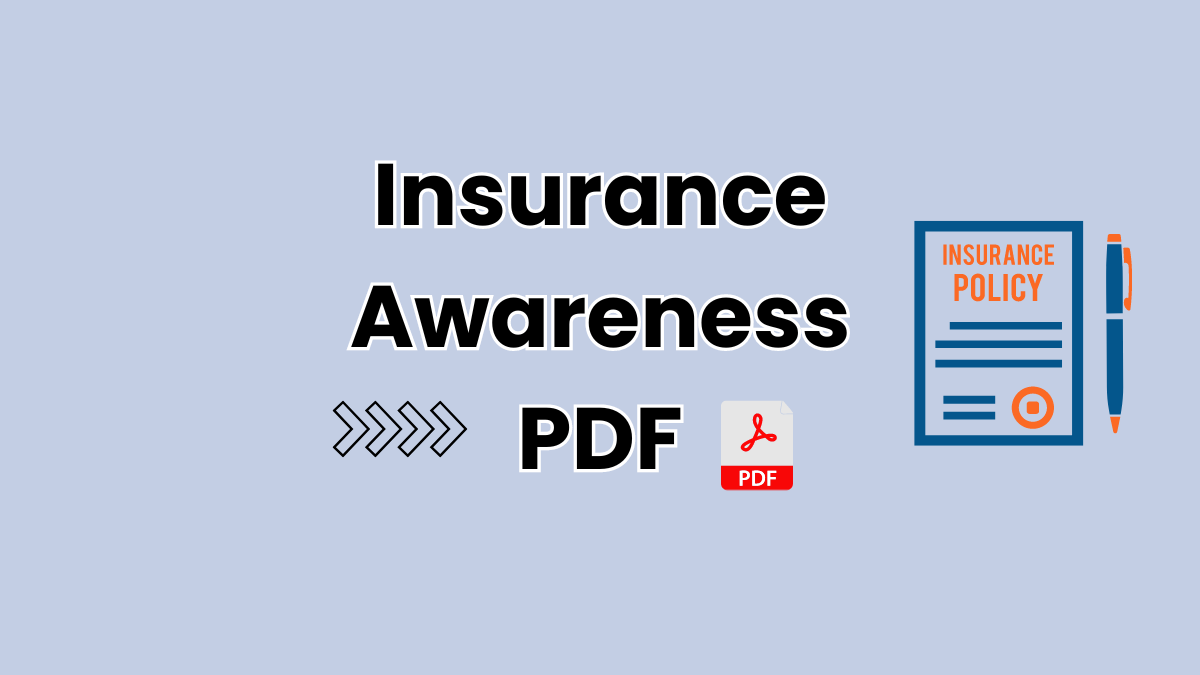Table of Contents
The concept of insurance awareness is based on the idea that individuals should have a good understanding of insurance policies and their importance in protecting their financial well-being. Insurance awareness involves educating people about the various types of insurance available, their benefits, and how to select the right coverage for their needs.
Concept of Insurance Awareness
Insurance awareness refers to an individual’s knowledge and understanding of insurance policies and their importance. It involves being aware of the various types of insurance available, such as health, life, auto, and property insurance, as well as the coverage and benefits they provide.
Ultimately, the concept of insurance awareness aims to empower individuals to make informed decisions when purchasing insurance, to ensure that they have the right coverage in place to protect themselves and their families in case of unexpected events.
What is Insurance?
Insurance is a risk mitigation instrument where a party transfers the risk of potential loss to an insurance company in consideration of a periodical payment called the premium. It is a contract between two parties where one who transfers the risk is called the insurer and the one who mitigates the risk is called the insurance provider. The insurance business is regulated by IRDA (Insurance Regulatory and Development Authority) in India.
Why Insurance is important?
In uncertain times when each one has one or other risks, insurance plays an important role. There are several reasons why insurance is important which are as follows:
- Financial Protection: Insurance provides financial protection to individuals and businesses from unexpected and costly events such as accidents, natural disasters, and medical emergencies. This protection helps them to recover from such situations without experiencing severe financial loss.
- Risk Management: Insurance companies analyze risks and assess their probability of occurring. They design insurance policies that help individuals mitigate those risks. Thus, insurance indirectly helps people to manage risks by minimizing the losses associated with uncertain events.
- Legal Requirement: In many countries, insurance is a legal requirement. For instance, auto insurance is mandatory in most states in the USA. Failure to comply with these legal requirements could lead to legal penalties such as fines, license suspension, and even imprisonment.
- Secure Investment: Insurance policies are an excellent investment option that offers guaranteed returns after the maturity period. These policies can serve as a secure investment for individuals who want to save for their future needs such as retirement, education, and healthcare.
- Peace of Mind: Knowing that you and your loved ones are protected during difficult times offers a sense of security and peace of mind. It frees you from worrying about the financial consequences of uncertain events and allows you to focus on what really matters in life.
- Promotes Economic Growth: Insurance helps to promote economic growth by providing financial security to businesses. A stable insurance market is imperative for businesses to expand, take risks and innovate. In addition, insurance encourages people to invest in new ventures and businesses, creating job opportunities and contributing to the overall development of society.
- Protection Against Liability: Insurance is crucial for individuals and businesses that face the risk of liability claims. Liability insurance protects against the financial consequences of lawsuits, ensuring that individuals and businesses can continue their operations and prevent bankruptcy.
- Encourages Prudent Financial Management: Insurance encourages people to practice prudent financial management. By paying premiums for insurance, individuals are prepared for unexpected events that happen in life, reducing the risk of financial distress. It also promotes responsible behaviour by encouraging people to identify potential risks and take necessary steps to mitigate them.
- More Affordable than You Think: Insurance is more affordable than most people realize. Moreover, insurance companies offer a variety of policies, allowing people to purchase coverage based on their specific insurance needs and budget.
Types of Insurance
Insurance policies are contracts between the policyholder and the insurance company. These policies are of different types depending on the risk they cover. Broad categories include life and general insurance. These are explained in detail below:
- Life Insurance:
Life insurance is a contract between an insurer and a policyholder, in which the insurer guarantees to pay a sum of money (known as the death benefit) to the designated beneficiary upon the death of the insured person. The policyholder pays a premium to the insurer at regular intervals, and the insurer provides financial protection to the policyholder’s family or dependents in the event of the policyholder’s death. Life insurance policies can also offer additional benefits such as savings and investment options.
- General Insurance:
General insurance, also known as non-life insurance, provides protection against risks and losses that may arise from unforeseen events such as accidents, theft, fire, natural disasters, and more. Examples of general insurance policies include health insurance, auto insurance, travel insurance, and home insurance. General insurance policies are usually taken for a limited period of time and the premium paid depends on various factors like the type of policy, coverage amount, and risk factors. Unlike life insurance, general insurance policies do not provide any savings or investment options.
Principles of Insurance
The principles of insurance refer to a set of guidelines and concepts that guide the insurance industry and its practices. The main principles of insurance are as follows:
- Principle of utmost good faith: This principle requires both the insurer and the insured to act in good faith and provide all relevant information about the risk being insured.
- Principle of insurable interest: This principle states that the insured must have a financial interest in the property or person being insured.
- Principle of indemnity: This principle states that the insured should be compensated to the extent of the loss suffered, but not more.
- Principle of subrogation: This principle allows the insurer to assume the legal rights of the insured after paying a claim.
- Principle of contribution: This principle applies when multiple insurance policies cover the same risk, and it states that each insurer should contribute proportionally to the claim.
- Principle of proximate cause: This principle states that the insurer should pay a claim only if the loss was caused by a covered peril.
- Principle of loss minimization: This principle requires the insured to take reasonable steps to minimize or prevent a loss.
These principles form the basis of insurance contracts and help ensure fairness, transparency, and consistency in the insurance industry.
Today, the Indian insurance industry is one of the largest and fastest-growing in the world. The presence of both public and private players has increased competition, resulting in greater product innovation and more customer-friendly policies. The industry has also been buoyed by India’s growing middle class, rising income levels, and increased awareness of the need for financial protection.



 UP LT Grade Teacher Previous Year Questi...
UP LT Grade Teacher Previous Year Questi...
 OTET Previous Year Question Papers, Down...
OTET Previous Year Question Papers, Down...
 CG TET Question Paper 2024 PDF Download
CG TET Question Paper 2024 PDF Download












